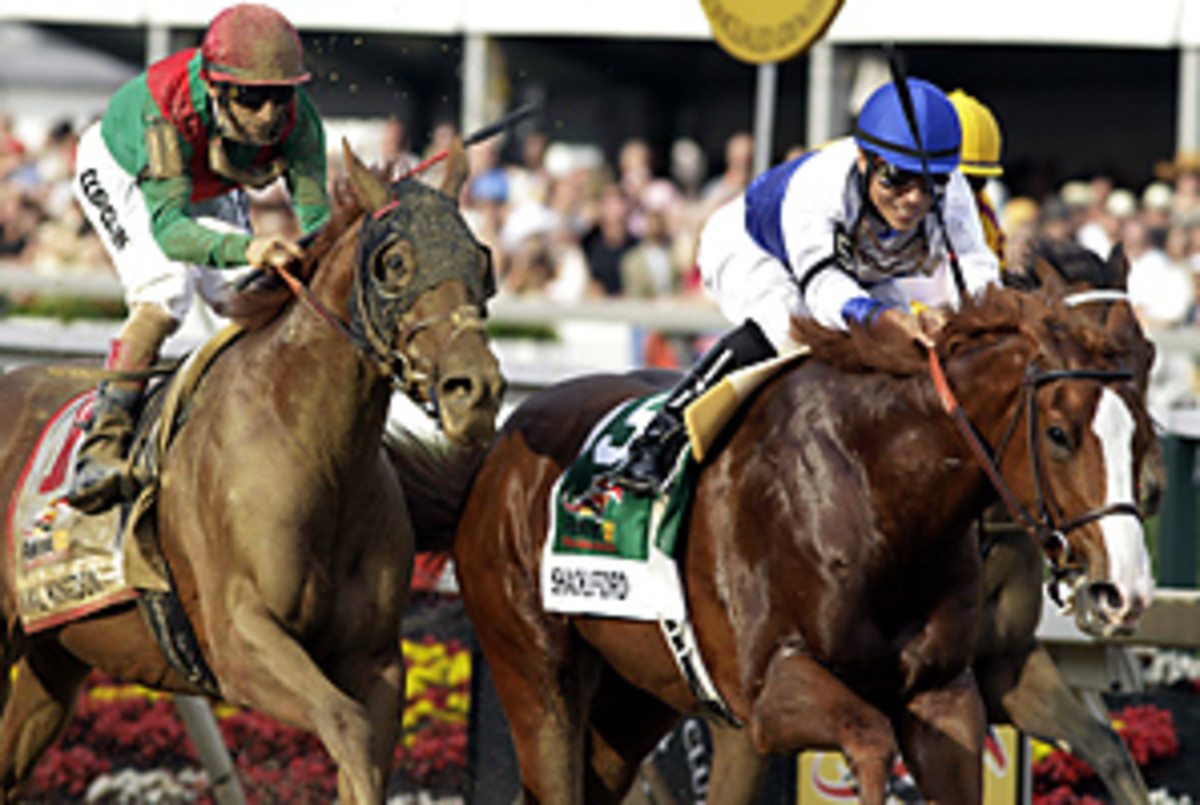What we learned at the Preakness
• Pace makes the race. Shackleford is a front-runner, and a quick learner. He had led the field two weeks ago at Churchill Downs with soft early fractions only to see Animal Kingdom pick him off before the wire. There was no way Shackleford was going to go out so slowly this time.
On Saturday at Pimlico, he again pressed the pace, this time behind early leader Flashpoint, who ran a quick first half mile in 46 4/5 seconds. Down the backstretch, Shackleford's lead over Animal Kingdom was immense, and it paid off after he took the lead at the top of the home stretch. The Derby winner made another valiant charge, but the Preakness is 110 yards shorter than the Derby, and this time Animal Kingdom ran out of room -- Shackleford edged him by a half-length.
• Animal Kingdom is a good horse -- not a great horse. Nobody, including many railbirds, even knew who Animal Kingdom was two weeks ago. His form suggested he was an improving, if lightly-tested, stretch runner who might have been in over his head at Churchill Downs.
GALLERY: Best shots from the Preakness Stakes
But under the wise care of trainer Graham Motion and a patient ride from jockey John Velazquez, Animal Kingdom delivered a career-best performance in Kentucky. His victory was so professional and so convincing -- even the reserved Motion noted that his colt had made it look easy -- he immediately stamped himself as a favorite for the Preakness.
But there are chinks in his armor, and Shackleford exploited them. Animal Kingdom is not an especially quick horse. Bred for the turf, he's a stretch runner who prefers to break slowly and work his way through the field. His loss in the Preakness, in which he nearly overcame an almost insurmountable lead, is not unlike the loss suffered by the magnificent mare Zenyatta in last year's Breeders' Cup Classic.
• Should Animal Kingdom run in the Belmont, he will very likely be the favorite. It is almost inconceivable Shackleford will win the Belmont Stakes in three weeks. He faded in the stretch in Kentucky and he was fading in the stretch at Pimlico -- there's little reason to think that his speed will be able to last over the Belmont's 1½-mile test. His running style is not that of a Belmont winner ... unless that Belmont winner is Secretariat. And Shackleford is no Secretariat.
Animal Kingdom, on the other hand, should love the immensity of the Triple Crown's third track. Unlike Shackleford, Animal Kingdom has been the fastest horse at the end of both of the first two races in this series. Having more room to run can only be to his benefit. Trainer Graham Motion is a careful horseman, but should he enter Animal Kingdom in the Belmont, the colt might win the thing in a gallop.
• Racing occasionally rewards the good guys. One of the nicest things about the 2011 Triple Crown is the first two legs have been won by two of the more respected horsemen in the industry -- first Graham Motion in Kentucky and now Dale Romans. Like Motion, Romans, whose father was renowned Kentucky trainer Jerry Romans, grew up in the racing business. Dale Romans took out his trainer's license at 18, a decade after he had already set on racing as his life's work. But he had never won any of racing's spring classics. Until Saturday, the biggest victory of his career had come in 2005, when his colt Roses in May won the $6 million Dubai World Cup.
Romans had come so close to winning the Derby -- his hometown event -- with Shackleford that he couldn't resist giving it one more try in the Preakness. His strategy for victory was perfect, and jockey Jesus Castanon executed it flawlessly.
• Thoroughbred racing's Triple-Crown drought goes on. It's been 33 years since Affirmed became the 11th horse to sweep the Kentucky Derby, Preakness and Belmont, the three races that make up the Triple Crown. Plenty of good 3-year-olds have come along in the last generation -- some of them were even great horses later in their careers -- but none have had the speed, stamina and maturity necessary to win all three races in succession.
There is no clear reason for this, only a variety of competing theories. Mediocre horses have won the Triple Crown before, most notably 1935 winner Omaha, who bested what was widely acknowledged to be a weak crop of 3-year-olds. But after so many recent near-misses, such a sweep doesn't seem possible anymore. The next Triple Crown champion, when he does finally come along-and he will come along some day -- is likely to be one of the finest race horses in many years. Bet on it.





